MATARA – Harischandra, a household name for decades in the food sector, is growing rapidly but cannot expand in its current location. It is looking for new land for expansion
The factory stands on a 5-acre land in the environs of the Matara town and when it began, there were no residencies around it. Today the area has become highly residential and, for this reason, Harischandra is not permitted any expansion by the authorities.
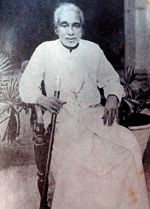 |
| Odiris Silva |
Saman Rasaputhra, Chief Financial Officer at the Harischandra group, told the Business Times (BT) that they plan to remove the coffee section and establish it in another location. They are also now searching for alternate land for further expansion of their industries.
Harischandra synonymous to Matara is a household brand in Sri Lanka, particularly packaged coffee and noodles – both are age-old products.
Powdered coffee packets have become the market leader and Harischandra Mill PLC has the honour of manufacturing noodles for the first time in Sri Lanka which too gained a fair share of that market.
The company has a unique business model as parallel to its commercial operations, it is also people-oriented or more employment oriented. Its product range is highly competitive where its competitors would be using high tech modern technology which would need only a few persons to operate. But in the case of Harischandra they shun technology as far as possible and all possible things are done manually so that more people could be offered opportunities, and their families looked after.
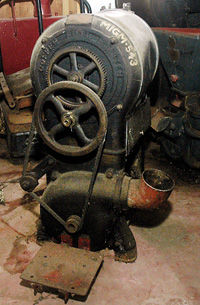 |
| Coffee roasting machine |
It is remarkable, as though manually operated, the company keeps up to all highly sophisticated international standards and though in such operations the overhead expenses would be high, they compete, expand their sales and make profits. Harischandra has become a part of the national heritage, for maintaining the originality of some of its products, particularly packeted coffee power and noodles.
To get to the roots as to how this pioneering business came into existence in Sri Lanka’s business world, the BT visited the Harischandra Mills PLC factory in Matara recently.
It is an ancestral business which came into existence, since around 1880s or earlier. Its founder Kandaudarata Arachchige Odiris Silva was born on 2 August 1867. His education was disrupted in the early days and then, turning to entrepreneurship he began to extract coconut oil by turning a Sekkuwa (a common device made out of granite and driven in a circular form by a bull in ancient times) belonging to his grandfather – Samichchi de Silva -, and earning three cents a day.
A hand-operated grinder made out of two chunks of granite – Kurahang Gala which was used to grind Kurakkan seeds in the early years of Harischandra is now on display at the factory.
He saved this three cents thriftily (a princely amount then) and when he grew up he became a businessman, first starting a retail shop and then venturing into running a rice mill. Mr Rasaputhra, who is in-charge of the total operations of the Harischandra Mills PLC in Matara, while taking the BT team through the factory, said that Mr Odiris Silva had five sons and six daughters. C. A. Harischandra was the fourth son who was really involved in his father’s business in around the 1940s, he graduated in economics.He said that Mr Harischandra was looking after some of his father’s business such as the Broadway Cinema and a printing press but subsequently he decided to start his own business and started a rice mill in Matara. The prowess of Mr Harischandra’s business ability was well known at that time and thus he was able to procure the contract to supply timber to the government and to the Army with the commencement of World War II in 1942. Harischandra Mills also won the contracts to supply rice to the Government.
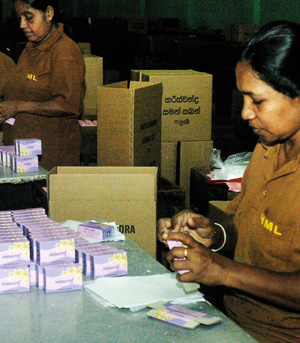 |
| Wrapping the soap |
S. N. Samarasinghe, one of the grandsons of Mr Harischandra, Managing Director, joined the company in 1990 and was appointed to the Board of Directors in 1993 and in October 2000 he was elevated to the position of Managing Director. He joined the company after the completion of his studies in England.
Mr Samarasinghe told BT that though Mr Harischandra became a versatile businessman employing best management and marketing practices, he also became one of the best known social workers involving in health and education and as such large amounts have been apportioned to such activities. Leaving a national heritage at the end, the legendary Mr Harischandra died in 1985 at the age of 74 years.
He said that broad-basing Harischandra or transferring partial ownership of the company to the workers was initiated by their founder Mr Harischandra as far back as 1952 selling 10% of shares to the employees.Mr Rasaputhra, showing the BT a small round implement which was preserved to this day in a special place in the factory, said that it was electrically operated and used for roasting coffee since colonial time. He said that powdered-coffee packets have become the market leader because the product maintains consistent product quality which understands precise taste and aroma of the Sri Lankans.
Sanath de Silva, son-in –law of Mr Harischandra is the Director Administration, while his wife the youngest daughter of Mr Harischandra is also one of the directors of the company. M. A. Bastiansz is the Chairman (Non-Executive).
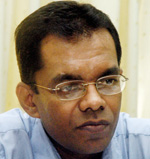 |
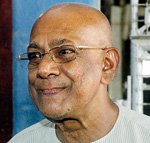 |
| Saman Rasaputra. |
P.K. Bandujeewa |
Mr Samaratunga said that Mr Harischandra who founded Harischandra Mills could be identified as the ‘Godfather’ of corporate social responsibility in Sri Lanka which he first practiced in his own establishment by allowing the workers a share of the company as far back as in 1952 and introduced the ‘Employees Provident Fund in the company in that year. The Government’s EPF scheme came into operation only in 1958. There are around 475 directly employed at present.
Harischandra Mills has recorded a profit of Rs 62 million after tax for 2011 and the gross revenue of the company for the same year stood at Rs 1.47 billion. The company is listed in the Colombo Stock Exchange. The share holders were offered a total dividend of Rs 30 per share.
Harischandra is now involved in a range of manufactured products which includes soaps, noodles, coffee, powdered spices, rice flour, Kurakkan flour and other gram powders.
Mr Rasaputhra showed how the soaps are wrapped by hand and said that almost all the packaging is done by hand to provide more employment and thus mechanical operation is minimal, trailing after footsteps of the founder Mr Harischandra.
BT spoke to the oldest hands serving Harischandra still; two of them are J. V. Sirisena who joined in 1956 and is now aged 75 years and the other is P. K. Bandujeewa who has served the factory for the last 30 years and they all reminisced the sweet memories of a kind, witty and dexterous man in the calibre of Mr Harischandra.
Mr Samarasinghe said that the uniqueness of Harischandra - while continuing as a profit making commercial establishment – continues to ensure (whatever possible) that all activities are handled by people than using sophisticated machinery.
Some of their products are exported and Mr Rasaputhra said that once they expand, they hope to get into the export market aggressively and the company is confident that they could acquire a huge share of export market when the foreigners come to know about their unique production process, emphasizing the people factor and their excellent labour relations too would be another plus point for their export success. |






